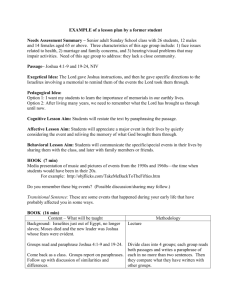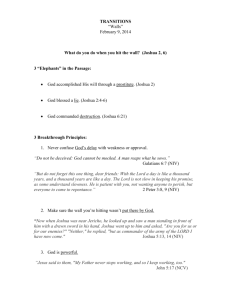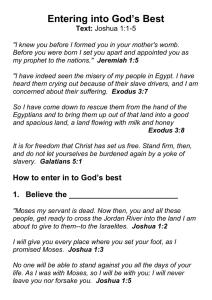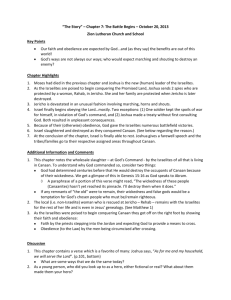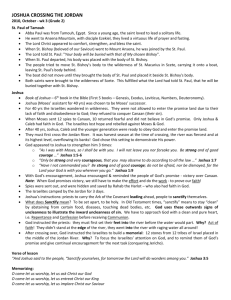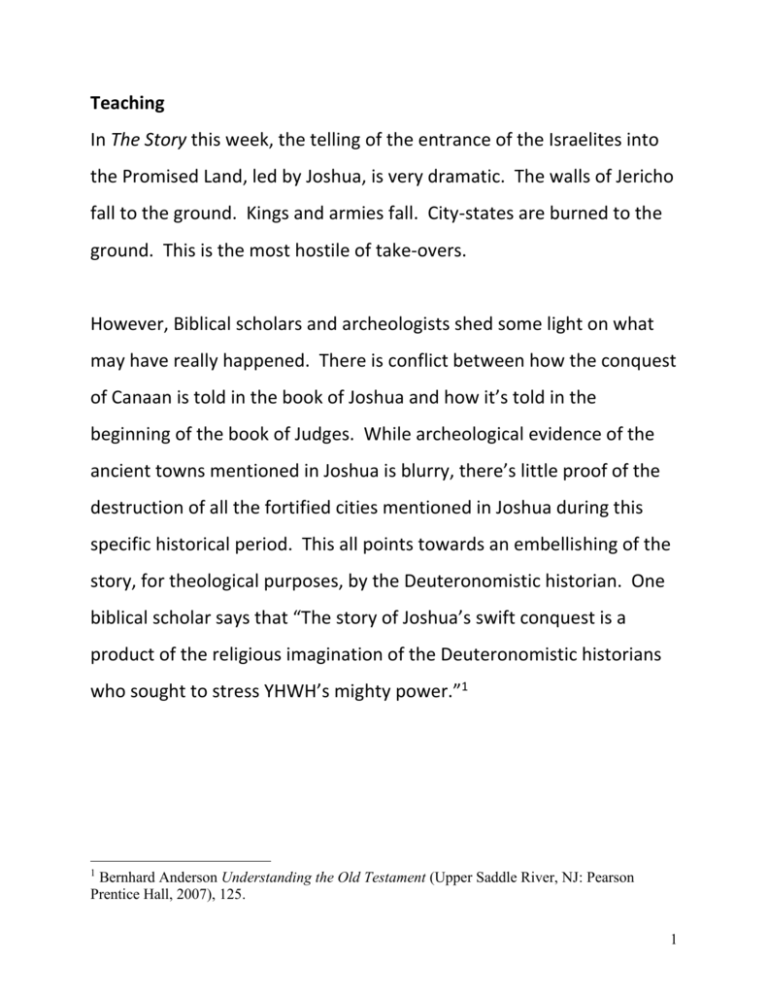
Teaching
In The Story this week, the telling of the entrance of the Israelites into
the Promised Land, led by Joshua, is very dramatic. The walls of Jericho
fall to the ground. Kings and armies fall. City-states are burned to the
ground. This is the most hostile of take-overs.
However, Biblical scholars and archeologists shed some light on what
may have really happened. There is conflict between how the conquest
of Canaan is told in the book of Joshua and how it’s told in the
beginning of the book of Judges. While archeological evidence of the
ancient towns mentioned in Joshua is blurry, there’s little proof of the
destruction of all the fortified cities mentioned in Joshua during this
specific historical period. This all points towards an embellishing of the
story, for theological purposes, by the Deuteronomistic historian. One
biblical scholar says that “The story of Joshua’s swift conquest is a
product of the religious imagination of the Deuteronomistic historians
who sought to stress YHWH’s mighty power.”1
1
Bernhard Anderson Understanding the Old Testament (Upper Saddle River, NJ: Pearson
Prentice Hall, 2007), 125.
1
All this ambiguity has led scholars to propose four different models of
how the Israelites settled in Canaan.2 Each has its strengths and
weakenesses, but here they are.
The first is called Peaceful Inflitration. This model proposes that the
Israelite settlement took many generations through a gradual
infiltration of pastoral nomads into Canaan and the sparsely settled hill
country. There were no serious clashes and the nomads got along with
the Canaanites and even intermarried.
The second model is Military Invasion. This follows closely the
narrative of Joshua that the Israelites conquered the land through
battles and forced entry. While there is no archeological evidence of
the destruction of the city of Ai, as told in Joshua, there is evidence of
destruction of the Canaanite city of Bethel, during the time of Joshua.
Scholars believe that the conquest of Bethel could have been confused
with Ai in the re-telling of the story. “There appears to be no reason to
deny that some of the Canaanite cities were destroyed by the
Israelites.”3
2
3
Anderson, 125-129
Anderson, 127.
2
The third model is Peasant Revolution. The conquest by the Israelites
coincided with an internal social revolution within Canaan by the
peasants against the network of Canaan city-states and their rulers.
This model is the weakest because there is barely any biblical and
archeological evidence to support it.
The final model is Ruralization. Archeologists have discovered a series
of settlements and a rapid population explosion in the highlands of
Canaan around the time of Joshua. “All indications are that large
numbers of people moved into the area from other places, settled
formally unoccupied territory, and then united with local inhabitants to
expand their territorial hold through armed conflict.”4 This model
because it best incorporates the biblical narrative of armed conquest
and the archeological evidence found in the hill country of Canaan.
No matter how exactly the Israelites entered Canaan and settled in the
land, we know that during the leadership of Joshua they remained
faithful to the God of their ancestors and followed the laws of Moses.
Sermon
4
Anderson, 128.
3
The Story Chapter 7 – The Battle Begins
Prayer:
Holy One, your word is a light in the darkness
and a source of blessing.
Pour out your Holy Spirit upon us;
enliven our hearts and minds
as we hear your word for us today. Amen.
Sadly, old Moses is dead. The mantle of leadership has been passed to
Joshua. The time of wandering in the wilderness is over. The 40 years
of struggle and challenge have passed for God’s people. The moment
they’ve been waiting for is here. As God says to Joshua, “My servant
Moses is dead. Now proceed to cross the Jordan, you and all the
people, into the land that I am giving to them.”
Joshua listened to God and led the people across the Jordan river.
During most times of the year, the Jordan is a slight trickle or water that
we’d barely call a river. But during the flood season, when Joshua leads
the people to the river bank, the Jordan is ferocious and swift moving.
Often in our lives, we are at moments where we can empathize with
God’s people on the edge of the Jordan River. There are times when
we stand at the edge of something new. Often it can seem a scary
place to be. We stare out into the unknown. Like, God’s people, we
look over a torrent of raging water and wonder how we can keep on
4
going. We trust that something better is coming, but we haven’t
experienced it yet and we become uncertain.
Some preachers encourage the faithful to be wild and take a leap of
faith. I know that I’m not that adventurous. I know few people who
would freely take the leap, just like a skydiver jumping from a plane.
The truth is that as people of faith, we are more likely to take a step in
faith. “Sometimes we have to take a step of faith before we can
receive the goodness of God’s dream for us.”5 Stepping out in faith is
consistent the narrative in the book of Joshua. The priests lead the
people of God as they wade into the water. Just like when Moses lead
the people through the Red Sea, God halts the rush of water down the
river and the people walk across the river bed.
As Joshua prepares to lead the Israelites through the water and across
the river, God says to Joshua, “As I was with Moses, I will be with you. I
will never leave you nor forsake you.” During the fearful, but exciting,
moments in our lives when we ‘cross the river’ we hear God saying this
to us too. This story reminds us that God is accompanying us in our
journey through life. As we stand at the riverbanks of our lives, God is
with us, just like God was with the Israelites at the Jordan. God
Michael Williams “Homiletical Perspective” Feasting on the Word Proper 26 – Joshua 3: 7-17
(Louisville: Westminster John Knox Press, 2011), 6.
5
5
protects us in times of transition and change. Through this story, God
speaks to us and says, “I will never leave you nor forsake you.”
Once the people made it across the Jordan, the military conquest of
Canaan began. The book of Joshua recounts many bloody conflicts.
The one most of us remember from Sunday School is the battle of
Jericho where the trumpet and sounds cause the walls to collapse. We
remember this part of the story with a popular gospel song???
The battles of the Israelites against the different kingdoms of Canaan
may seem foreign to us in our peaceful existence here, but it does
connect the reality of the world today. Sadly, there is still tribalism and
imperialism in our world today. The military-industrial complex is
running at full force. Nations are still engaged in warfare and conquest.
We only need to look at the recent news reports of the NSA email and
telephone spying in the US and of Canadian intelligence spying on
Brazilian mining officials to see that fear, nationalism and imperialism
are alive and well. Instead of using trumpets and shouts in the battle,
robotic drones drop bombs. Instead of troops lining up at the city
gates, off-shore missiles are launched. As Christians, we are trying to
live faithfully in the midst of this empire. As people of faith and
6
followers of the prince of Peace, we pray for peace and speak out
against injustice.
Reminiscent of the last speech of Moses, the story of Joshua ends with
Joshua preaching to God’s people shortly before he dies. Joshua
reminds the people of all that God has done for them. Saving them
from slavery in Egypt. Leading them to freedom. Providing for them in
the wilderness. Aiding them in battle and their conquests in Canaan.
Giving them a new land. In the midst of a foreign culture of many gods,
Joshua proclaims his faith and says, “As for me and my household, we
will serve the Lord.” Joshua remains faithful to the God of Abraham,
Isaac, Jacob and Moses. Then God’s people restate their commitment
to God. Like parents at a baptism or youth at confirmation, the
Israelites make vows.
Joshua said, “So now Worship God in total commitment. Get rid of the
gods your ancestors worshiped on the far side of The River and in
Egypt. You, worship GOD. If you decide that it’s a bad thing to worship
GOD, then choose a god you’d rather serve—and do it today. Choose
one of the gods your ancestors worshiped from the country beyond The
River, or one of the gods of the Amorites, on whose land you’re now
living. As for me and my family, we’ll worship GOD.”
7
The people answered, “We’d never forsake GOD! Never! We’d never
leave GOD to worship other gods. GOD is our God! He brought up our
ancestors from Egypt. He did all those great signs while we watched. He
has kept his eye on us all along the roads we’ve traveled.
Count us in: We too are going to worship GOD. He’s our God.”
Then Joshua told the people: “You can’t do it; you’re not able to
worship GOD. He is a holy God. He won’t put up with your fooling
around and sinning. When you leave GOD and take up the worship of
foreign gods, he’ll turn right around and come down on you hard.”
But the people told Joshua: “No! No! We worship GOD!”
And so Joshua addressed the people: “You are witnesses against
yourselves that you have chosen GOD for yourselves—to worship him.”
And they said, “We are witnesses.”
Joshua said, “Now get rid of all the foreign gods you have with you. Say
an unqualified Yes to GOD, the God of Israel.”
The people answered Joshua, “We will worship GOD. What he says,
we’ll do.”
The people of God are faithful to the Holy One. The One who says, “I
will never leave you nor forsake you.” As members of the great family,
we join together in the vows of God’s people and commit to
worshipping God and being faithful to God alone. We worship God
who protects us, who leads us and who quells our fear.
8
Pastoral Prayer
God of captives and pilgrims,
you brought your people home from despair
and gave them a land of freedom and plenty.
Look in mercy on us your servants,
deliver us from the prison of selfishness and sin,
and bring us home to justice, sharing, and compassion,
the realm you promised all the world
God of life, we praise you for your abiding presence
from generation to generation,
blessing your people,
strengthening us to lives of service,
empowering us to witness.
Hear the prayers we offer on behalf of your creation.
Prayers of the People, concluding with:
Grant that as we serve you now on earth,
so we may one day rejoice with all the saints
in your kingdom of light and peace,
through Jesus Christ our Lord. Amen.
9

